I feel like I do some of my best writing out of a sense of “irritation.”
By irritation, I mean that feeling that something is wrong, but you can’t quite put your finger on it, and figuring it out requires thinking my way through the irritation. Not to be too precious about it, but it’s like how a grain of sand in the oyster is the origin for a pearl.
But irritation is tricky. Sometimes you can mistake aggravation for irritation but they are not the same thing. Aggravation is an intensification of an already existing problem, an escalation, and when I write out of aggravation my desire to inquire shuts down, and instead I mostly want to argue, not just to say something I think is “right,” but to make sure everyone else knows someone else is wrong.
Regular readers can then imagine my intense aggravation after reading the latest cover story in The Atlantic by David Brooks.
I will not rehash my nearly two-decade-long problem with David Brooks’s writing and how it plays a role in American culture because I already did that in a previous newsletter, but suffice to say that there has been no greater defender of the meritocratic structures than David Brooks. His critique of the meritocracy is and has been primarily moral, that the elite need to make better choices in the service of guiding their own lives and ultimately the nation itself as one of the elite. Whether or not we should invest so much of our national resources and cultural energy into the meritocracy has not seemed to previously occur to him. Even the framing of the article fails to clearly see the issue, suggesting that the Ivy League failed us, rather than what I think is more accurate, that we failed by investing so much into the meaning of the Ivy League.
In this latest installment, Brooks comes closer to what I’ve been saying for a decade plus, that the structures which govern our system of higher education don’t make any sense.
What’s wrong with me that the chief source of my aggravation is that David Brooks now agrees with me? Is this any way to go through life as a contented and productive person?
No. Which is why I’m now going to write about something else.
There were almost innumerable things to get irritated, agitated, angry, depressed, and despairing over this past week. It is difficult not to feel as though the news could overwhelm you and avoiding these feelings has already required an active individual practice to control my information diet.
Unlike the first Trump administration, I intend to be vigilant, but not hyper vigilant. There’s spectacle, and then there’s things that matter, and the vast majority of the coverage of what he’s up to is spectacle. I found this tweet from NBC news director Chuck Todd illustrative:
Todd is playing up the spectacle that will attach to the parade of freaks, grifters, and weirdos Trump is nominating for various high level government positions. Speaking for myself, this time around, I’m out. (I think I’m not alone in this.) If Trump takes a Sharpie to a hurricane forecast so he can try to prove himself correct about a state being threatened by a storm, I don’t want to know about it. The fact that I have this memory and dozens of other bits of spectacle from his first term lodged in my brain is a sad commentary on how I was spending my time.
I’m going to counter program with something I know I enjoy. Whenever I’m tempted to go down the well of spectacle, I’m going to pick up a book and read.
Don’t get me wrong, while I love reading, I don’t ascribe magical properties to books or reading. I don’t know or care if books make you a better person or smarter or more empathetic. What I do know is that reading is engaging in a way few other things can match for me. I imagine the sorts of people who have been drawn to a newsletter that’s supposed to be about books may feel similarly.
So, this week, for no particular reason other than the world feels short of this spirit right now, I’m going to share some of my favorite books about people being genuine decent to other human beings.
Books Featuring Good-Hearted People
May Attaway is a botanist and book lover who is feeling some vague emotional turbulence, and in response decides to go visit some of her friends, one after the other. Rules for Visiting by Jessica Francis Kane is a novel that manages to be gentle and deep, and quiet and moving at the same time without descending into emotional treacle. It’s truly an amazing balance. You will feel genuinely warmer about people and the world while reading this book.
Catch me in the right mood and I’d tell you that Tom Drury’s The End of Vandalism is my favorite novel. Set in a midwestern small town where everyone knows everyone and therefore every interaction carries some personal history, there’s plenty of conflict, but the conflict is set against a backdrop where everyone knows they have to get along because all they have is each other. There’s two more installments of Drury’s Grouse County trilogy after this, Hunts in Dreams and Pacific.
I have recommended this book to a good half-dozen real-life people now, and when I describe Search by Michelle Huneven as the story of a Unitarian church in coastal Southern California trying to choose a new minister, they can’t imagine finding it interesting, and then after they finish it they’re astonished by how emotionally invested they got in the whole thing.
Junior Thibodeau, the main character of Ron Currie Jr.’s Everything Matters! is born knowing two things, that he is an unparalleled genius, and also the exact date and time of the end of the world. This knowledge understandably hovers over every act of Junior’s life and makes the question of what kind of life one should lead both pointed and poignant. I used to teach this novel as part of the gen ed literature course I was responsible for at Clemson and the students almost universally named it as the favorite thing they read during the semester.
Alright, that’s four from me. Now it’s your turn. What are your favorite books featuring good-hearted people being decent to others?
Links
This week at the Chicago Tribune I appreciated the life and work of Dorothy Allison, author of Bastard Out of Carolina, who passed away recently.
At Inside Higher Ed I took a closer look at the concept of “institutional neutrality” and how some of the groups that are calling for universities to adopt such a framework are asking those universities to violate a core part of practicing institutional neutrality.
Another banger of a newsletter from
, this time unpacking what we talk about when we talk about a book “transcending” commercial fiction.Time has the “100 must-read books of the year.” I’ve read seven with an active plan to read an additional four. Who has me beat?
I’ve read two of Vulture’s best books of the year.
I’ve read zero of Kirkus’s best fiction of the year, but as soon as Mrs. Biblioracle is done with Miranda July’s All Fours, I’ll be getting on that.
In something of an upset, Orbital by Samantha Harvey won the Booker Prize.
Recommendations
1. “Playground” by Richard Powers
2. “The Rich People Have Gone Away” by Regina Porter
3. “James” by Percival Everett
4. “All the Colors of the Dark” by Chris Whitaker
5. “Julia” by Sandra Newman
Marc C. - Charleston, SC
I’m going to stick with this week’s newsletter theme and recommend another book that features decent people being good to each other, The Explanation for Everything by Lauren Grodstein.
1. Stone Yard Devotional by Charlotte Wood
2. Orbital by Samantha Harvey
3. Juice by Tim Winton
4. Margot’s Got Money Troubles by Rufi Thorpe
5. Intermezzo by Sally Rooney
Liz H. - Perth, Western Australia
Both Intermezzo and Margo’s Got Money Troubles would qualify for today’s list. You can’t beat J. Ryan Stradal for some good, warm human drama: The Lager Queen of Minnesota1
Pre-orders really do help when it comes to the success of books, which is why I will continue to ask you to consider pre-ordering More Than Words: How to Think About Writing in the Age of AI. Just look at what
of Harvard University has to say!If you’re looking for a movie about decent people being good to each other, Mrs. Biblioracle and I enjoyed My Old Ass.
Bonus content coming this week. Stay tuned Tuesday.
Be good to each other.
JW
The Biblioracle
All books (with the occasional exception) linked throughout the newsletter go to The Biblioracle Recommends bookstore at Bookshop.org. Affiliate proceeds, plus a personal matching donation of my own, go to Chicago’s Open Books and an additional reading/writing/literacy nonprofit to be determined. Affiliate income for this year is $124.00.




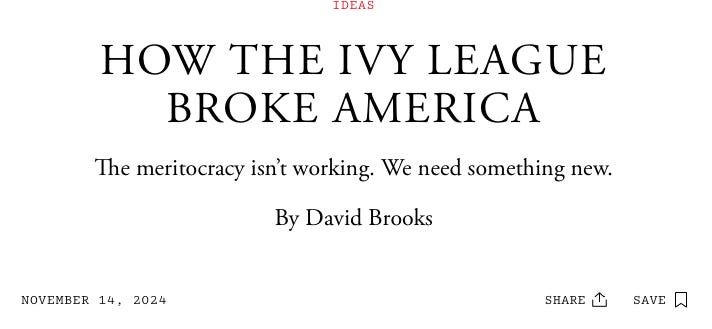

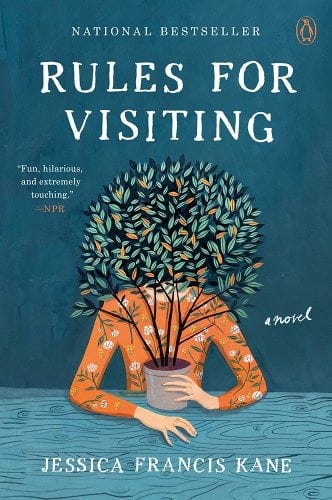
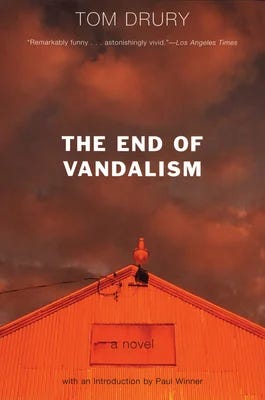
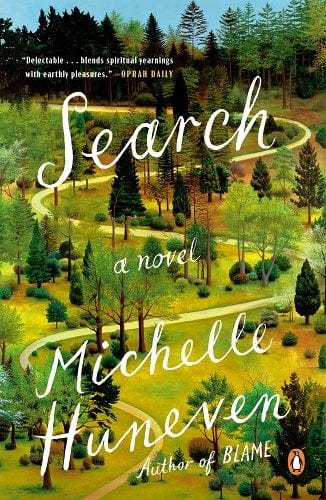
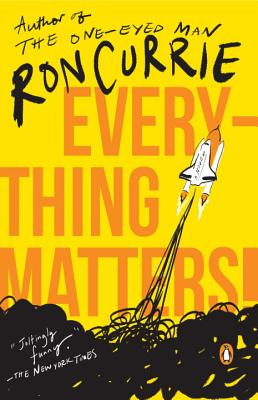
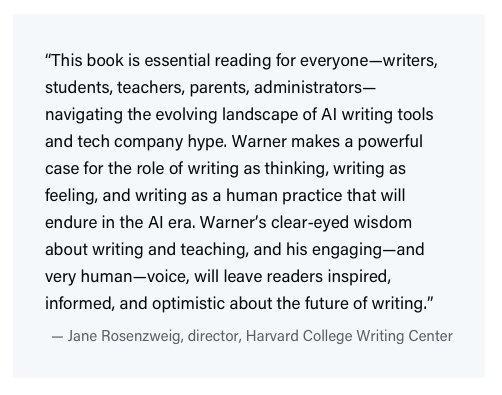
I think one lesson of Trump 1.0 is that pointing and shouting, "Look! He did something terrible right there!" and expecting that this, somehow, will be the straw that finally breaks his hold on his supporters-- it just doesn't work. Better this time around to focus on standing up for what is good and sheltering it from the storm.
Thank you, John, for the typical thoughtful, reasonable, helpful article. Amen to all of it. My suggestion for your list is Plainsong by Kent Haruf. I read it a few years ago, and enjoyed it greatly. For readers who like a number of books in a "shared universe," like those of (gotta drop the names) two of my favorite authors, Barbara Pym and Elizabeth Strout, Haruf wrote a few set in the same fictional Colorado town.